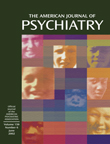Prolongation of QTc Interval and Antipsychotics
To the Editor: Schizophrenic patients have a higher risk of cardiovascular mortality than healthy individuals, possibly because of excessive smoking, the schizophrenic psychosis itself, or a combination of both factors. Of interest, the risk of sudden cardiac death for individuals receiving antipsychotic drugs is about 2.4 times greater than that for nonusers (1). The reason for this awaits a definitive explanation. A recent review by Drs. Glassman and Bigger focused on the relationship between prolongation of the QTc interval induced by a neuroleptic and the probability of the occurrence of sudden cardiac death. It was found that various antipsychotic drugs prolong mean QTc intervals differently; for phenothiazines (e.g., thioridazine), this effect is particularly strong and appears to be clinically relevant. However, not all drugs that prolong QTc intervals also produce torsade de pointes and sudden cardiac death. For this reason, neuroleptic-induced prolongation of QTc intervals can only be considered a warning for the possibility of torsade de pointes and sudden death and not a definitive indicator for the risk itself.
Additional factors that might be at least partly responsible for the greater cardiovascular morbidity and mortality in schizophrenic patients are alterations in cardiac autonomic nervous system (ANS) function. Untreated schizophrenic patients have a higher resting heart rate than healthy individuals, which has been explained by a higher level of arousal in these patients. During antipsychotic treatment with sertindole or clozapine, another significant increase in heart rate occurs, probably mediated by an indirect sympathetic activation by means of a counterregulatory increase of catecholamines from the α-receptor-blocking activity of both of these drugs (2).
A faster heart rate has been found to be a significant independent predictor of cardiac events, including sudden cardiac death (3). Ben-David and Zipes (4) emphasized that the integrity of the ANS is important for preventing, promoting, or precipitating cardiac arrhythmias and sudden cardiac death. Disruptions in cardiac ANS regulation, expressed as a reduction in the variability of the heart rate—i.e., as a reduced modulation of vagal activity to the heart or a displacement of sympathovagal balance in favor of sympathetic modulations—are independent predictors for the appearance of cardiovascular complications, both in patients with coronary heart disease or a previous myocardial infarction and even in apparently healthy individuals without any structural heart disease. Antipsychotic drugs influence neurocardiac regulation in a manner dependent on their receptor profile; e.g., clozapine induces a dramatic reduction in heart rate variability, presumably because of its strong anticholinergic properties (2). Thioridazine might also bring about an increase in heart rate and a reduction in heart rate variability because of its α1-antiadrenergic and anticholinergic effects. Both drugs have been linked to serious cardiac problems in clinical practice.
Because of these findings, long-term studies are urgently needed to clarify whether the effects of antipsychotic drugs on cardiac ANS function—in particular, a neuroleptic-induced increase in heart rate and a reduction in heart rate variability—augment the risk for the appearance of cardiac arrhythmias and sudden death in schizophrenic patients who are treated with antipsychotic drugs.
1. Ray WA, Meredith S, Thapa PB, Meador KG, Hall K, Murray KT: Antipsychotics and the risk of sudden cardiac death. Arch Gen Psychiatry 2001; 58:1161-1167Crossref, Medline, Google Scholar
2. Agelink MW, Majewski T, Wurthmann C, Lukas K, Ullrich H, Linka T, Klieser E: Effects of newer atypical antipsychotics on autonomic neurocardiac function: a comparison between amisulpride, olanzapine, sertindole, and clozapine. J Clin Psychopharmacol 2001; 21:8-13Crossref, Medline, Google Scholar
3. Kannel WB, Kannel C, Paffenbarger RS Jr, Cupples LA: Heart rate and cardiovascular mortality: the Framingham Study. Am Heart J 1987; 113:1489-1494Crossref, Medline, Google Scholar
4. Ben-David J, Zipes DP: Autonomic neural modulation of cardiac rhythm, part I: basic concepts. Modern Concepts of Cardiovascular Disease 1988; 57:41-46Google Scholar



